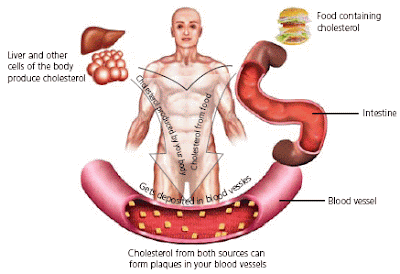Cholesterol has the image of being bad for your health. If you get too much of it in your arteries, it can cause obstructions that result in stroke or a heart attack. The body possesses a complex system of cholesterol transport, of which HDL and LDL are the most well-known molecules. Functioning as carriers, they move cholesterol around, but they do so in different ways. While HDL transports it from the bloodstream into the liver, to be recycled, LDL actually lets cells take up cholesterol. That is why HDL is known as good, and LDL as bad. Many studies have been performed regarding cholesterol metabolism, and the role of HDL, LDL and other carriers is fiercely debated. Now, a study concerning a large number of people found that HDL may not be worthy of the label 'good'.
Study
Scientists from the Broad Institute and Massachusetts General Hospital looked at medical data of 170.000 individuals. They tried to link levels of HDL to incidence of heart attack: they tested 15 different genes that, when expressed, can increase the levels of HDL, highlighting how complex cholesterol metabolism is. By uncovering how genetic factors relate to clinical outcomes such as heart attack, the scientists tried to find evidence for the hypothesis that HDL plays a role in protecting blood vessels against take-up of cholesterol.
Results
Despite analysing 15 genes that raise HDL levels, they did not find a single one that positively affects health. No relationship between expression of these genes and a decrease in cardiovascular disease was found. This leaves us wondering why HDL is associated with health benefits, but it does fit with earlier studies of genetic diseases that caused lower levels of the cholesterol carrier: patients suffering from low HDL were not associated with higher incidence of heart attack or stroke. Because no gene could be attributed to positive health outcomes, scientists could not derive proof that says HDL is healthy for us.
Good or bad
One thing is certain: cholesterol is bad when it builds up in artery walls. Eventually, that will cause blockages and ruptures, which naturally is far from healthy. HDL is supposed carry circulating cholesterol back to the liver where it can be transformed into something else, but it seems that higher levels are not necessarily correlated to increased cardiovascular health. Previous studies have already shown that high HDL may not actually make you more healthy, but this study, by combining medical data of many individuals, gives a clear view on the relationship between HDL and health.
Outlook
We are still far from done when it comes to researching cholesterol metabolism. Due to the complexity and confusing results, we have yet to find a way to increase health by preventing cholesterol build-up. It used to be so simple: HDL is good and LDL is bad. But nothing is what it seems, when it comes to how the body handles its cholesterol. More studies are necessary to uncover mechanisms that will actually help us make our heart and vessels more healthy. Because 15 genes could not provide the scientists with an answer to why HDL is considered healthy, and there is no drug to artificially raise its levels, one might ask whether we will ever find a beneficial treatment option.
Study
Scientists from the Broad Institute and Massachusetts General Hospital looked at medical data of 170.000 individuals. They tried to link levels of HDL to incidence of heart attack: they tested 15 different genes that, when expressed, can increase the levels of HDL, highlighting how complex cholesterol metabolism is. By uncovering how genetic factors relate to clinical outcomes such as heart attack, the scientists tried to find evidence for the hypothesis that HDL plays a role in protecting blood vessels against take-up of cholesterol.
Results
Despite analysing 15 genes that raise HDL levels, they did not find a single one that positively affects health. No relationship between expression of these genes and a decrease in cardiovascular disease was found. This leaves us wondering why HDL is associated with health benefits, but it does fit with earlier studies of genetic diseases that caused lower levels of the cholesterol carrier: patients suffering from low HDL were not associated with higher incidence of heart attack or stroke. Because no gene could be attributed to positive health outcomes, scientists could not derive proof that says HDL is healthy for us.
Good or bad
One thing is certain: cholesterol is bad when it builds up in artery walls. Eventually, that will cause blockages and ruptures, which naturally is far from healthy. HDL is supposed carry circulating cholesterol back to the liver where it can be transformed into something else, but it seems that higher levels are not necessarily correlated to increased cardiovascular health. Previous studies have already shown that high HDL may not actually make you more healthy, but this study, by combining medical data of many individuals, gives a clear view on the relationship between HDL and health.
 |
| Cholesterol comes from body cells or food. (source) |
We are still far from done when it comes to researching cholesterol metabolism. Due to the complexity and confusing results, we have yet to find a way to increase health by preventing cholesterol build-up. It used to be so simple: HDL is good and LDL is bad. But nothing is what it seems, when it comes to how the body handles its cholesterol. More studies are necessary to uncover mechanisms that will actually help us make our heart and vessels more healthy. Because 15 genes could not provide the scientists with an answer to why HDL is considered healthy, and there is no drug to artificially raise its levels, one might ask whether we will ever find a beneficial treatment option.

No comments:
Post a Comment